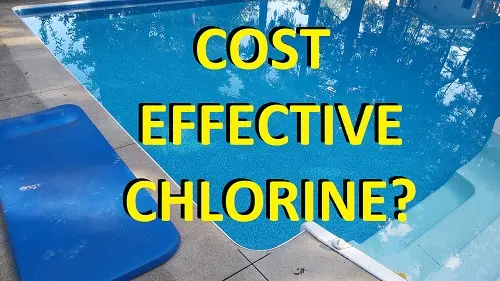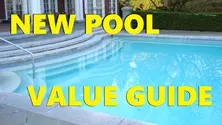Cheapest Chlorine Option For Pools
SwimmingPoolSteve.com is user-supported. In order to keep this resource about pools and spas available for free to all readers I earn commissions for purchases made through links on this page. For more information see the full disclaimer page. By using this website you are agreeing to the terms and conditions.

Many pool owners spend a lot of time (and money) trying to find alternatives to chlorine for maintaining their pool water. As a pool industry professional, there are a host of secondary options (chemicals) as well as supplementary and peripheral devices you can install to help with this...but you still need chlorine. It is the safest, most reliable and verifiable via water testing method that we have to maintain safe swimming pool water. I often advise pool owners it is a mistake to seek out alternatives to chlorine, all of which will cost more and work less well than chlorine, when you have such a reliable option already available to you. Instead I strongly encourage pool owners to learn how to work with chlorine better.
When you learn how to work with chlorine better you will be able to accomplish the same thing in that you will be able to reduce the amount of chlorine that you use in your pool. Doing this will also result in less corrective treatments to the other water chemistry variables...in total less chemicals used at the end of the year, without omitting or skipping out on the most important one in your pool - chlorine. So once you understand that we need chlorine, it is actually immensely beneficial, and you can actually minimize the amount you use by learning about proper pool water chemistry and balancing, you might arrive at the question about what is the cheapest, most economical way to buy chlorine for your pool. Let's consider this question closer:

Types of pool chlorine - While there are many different types, forms, concentrations and methods to get chlorine into your swimming pool you might find it interesting to note that once they are in the water, they are all exactly the same thing...hypochlorous acid. While it is true that there are additional differences and considerations with chlorine types, like some having high pH, some low, and some relatively neutral to your water, once you put that chlorine in the pool you have hypochlorous acid. So in this sense it does not really matter where you get your chlorine, or what kind you use, when you measure 2 parts per million of free chlorine in your pool that is the same thing no matter which chlorine you added to get there. So since we have levelled the playing field a little bit here with the chlorine you use, we can start to look at the most economical way for you to get the chlorine that you need. The first step in this consideration would be to first look at, in addition to the chlorine, what else you are getting packaged in with your chlorine products. This will be the make-or-break point for a lot of pool owners here so read this next section carefully.
Chlorine cost considerations - Before I can answer what the cheapest type of chlorine is first I want to address how there is an additional hidden expense here that we need to account for. All types of chlorine will add a residual to your pool. Depending in the kind of chlorine you are using, you will end up with building residual levels of sodium, calcium or cyanuric acid. Or a combination of these. Each of these is a concern in that anything you add to the water continually will build up over time. Eventually, each of these can build to problematic levels, at least to some degree. Salt residuals, like from sodium hypochlorite (liquid chlorine) is probably the least concerning of the bunch. Slowly over time your sodium levels will climb but it takes extremely high salt levels to become a problem. Heck, with salt chlorine generators you purposefully add 3000ppm of sodium right to the water, and aside from some increased galvanic activity between dissimilar metals, all is fine in the pool. However, both calcium buildup (from calcium hypochlorite) as well as cyanuric acid (from stabilized chlorine like dichlor / trichlor pucks) can cause problems sooner than later. Concrete pools can have quite a high amount of calcium hardness before it causes a problem, and to a lesser degree so can vinyl liner and fiberglass pools, but eventually the high calcium levels can contribute to staining and scaling in the pool and within the pool equipment. Cyanuric acid is easily the worst offender of the bunch here. When you add 1ppm of stabilized chlorine to the pool you are adding also almost 1ppm of CYA. The ideal range for CYA is only 30 to 50 ppm. By the time you reach 100ppm you likely will be struggling with water that does not look very good. So unlike sodium which can be upwards of 3000ppm in your water, and calcium hardness which can be upwards of 1000ppm, the biggest (hidden) chlorine cost is likely from stabilized chlorine products which will build up high CYA levels which will require you to partially drain and refill your pool with fresh water. All from the chlorine you chose to use. If we look at the true cost of the chlorine you are using, you need to factor in this important (and relatively costly) consideration. Any chlorine which dos not require you to partially drain and refill almost certainly will cost you less than a chlorine that will require hundreds of dollars in fresh fill water every year.
What is the cheapest chlorine option for pools? - This question is a little hard to answer directly as there are different areas where certain products are harder to find, but in a general sense the most economical option for chlorine for your pool will be liquid chlorine from a local pool and spa retailer. The reason why is because pool chemical stores know how to buy, rotate and store chemical stock better than big box hardware stores who give this little to no consideration at all. Pool stores will have fresher, higher concentration chlorine products, and they will also likely use chlorine sales as a "loss leader" to get you into the store to hopefully buy other things while you are there picking up chlorine. Often you can find buy 10 get 1 free promotions from local stores, which is a great way to reduce your costs by almost 10% right away. Liquid chlorine is not stabilized so it will not add CYA to your pool. It will add sodium but in such small amounts that likely it will never amount to problematic levels. Since liquid chlorine is not stabilized, this means storage and fresh stock is very important. Old liquid chlorine will have less concentration that fresh chlorine, so this alone is enough reason to shop from a pool and spa store alone. As for the next best options, depending on where you live, a 5 gallon bucket of unstabilized granular chlorine can be quite affordable, last a long time, and will not contribute to climbing CYA levels.
Why salt chlorine is NOT the cheapest chlorine option - Chlorine generated from salt water electrolysis has advantages relating to convenience, but this is very unlikely to be the most cost effective way to get chlorine for your pool...but it might be the easiest. It is important to know you will also need external chlorine treatments when you have a salt system, so it does not replace buying chlorine entirely. Plus you have to factor in the cost of the unit, plus installation, plus hundreds of pounds of pure salt being added to the pool. It is not a blowout in the sense that there certainly is value in being able to generate your own chlorine for the next three to five years (average salt cell lifespan), and also chlorine generated from salt does does not add cyanuric acid to the pool, but very likely if you add up the amount of liquid chlorine you would buy in three to five years of using your pool and compared this to the cost of a salt system and associated costs, likely the traditional liquid chlorine treatment would be more cost effective.
It is important to understand that every pool is unique. What one pool might use for chlorine in a year could be half as much as a pool that gets more use, or is larger, or has more direct overhead sun on the pool during the day...so many variables that will change the potential cost equation for how much you spend on chlorine for your pool. If you are a pool owner and you want to figure this out for your pool, then I would recommend to spend one swimming season using liquid chlorine and tracking how much of it you use weekly, monthly and for the season as a whole.
After just one swimming season of tracking your chlorine use you will have the information you need, which is unique to only your pool, which you can use to make cost comparison calculations for something like comparing your current chlorine costs to that of having a salt chlorine generator installed. At the end of the day, for most pools, using liquid chlorine as your chlorine source, avoiding stabilized chlorine products, and maintaining your pH and alkalinity levels with muriatic acid and baking soda will likely be your bet option to economical water chemistry maintenance in your pool.
You might be interested in this video: What is the best way to add liquid chlorine to a pool?
Top content from www.SwimmingPoolSteve.com
Pool and spa chemistry crash course
New pool owner guide
The Swimming Pool Steve blog
Have a question - ask Steve

Swimming Pool Steve is an award winning, second generation swimming pool specialist from Ontario Canada and one of the most trusted voices in the swimming pool industry. With over 20,000,000 views on the Swimming Pool Steve YouTube Channel, winner of the Pleatco Pool & Spa Industry Leadership award and author of hundreds of pool and spa articles both online and in print. Steve is committed to helping pool and spa owners as well as pool and spa industry workers learn more about the technical side of building, renovating, repairing and maintaining all types of swimming pools and spas. Follow Swimming Pool Steve on Facebook, Twitter and YouTube.
Paid PDF Books From Swimming Pool Steve
 Steve's Pool Survival Guide
Steve's Pool Survival Guide
The Swimming Pool Steve Pool Survival Guide is intended to help pool owners understand their pool and pool equipment better, understand water chemistry, water testing and chemical corrections to the water, troubleshoot the most common pool problems and have confidence in interacting and caring for their pool in the fastest possible frame of time. Also covers pool safety, things to avoid and how to operate your pool more efficiently.
 New Pool Installation Value Guide
New Pool Installation Value Guide
This is a value shopping guide written by Swimming Pool Steve to help home owners hiring for a new pool installation to get the maximum value for their investment with tips about how to protect your interests during the vetting, hiring and pool installation process. Anyone serious about having a pool installed will find value in this guide. Pool installers will sell the pool package that is best for them - not for you! Become an informed value shopper with this PDF guide.
Endorsed Brands From Swimming Pool Steve
The following links and products are to affiliates of the Swimming Pool Steve website. These are brands, products and services hand selected by Steve for endorsement. Please note that these endorsements can include monetary compensation, affiliate links and referral fees to Swimming Pool Steve, however there is zero additional cost to you should you use one of these products or services. Income generated from these links helps to keep this pool and spa resource available for everyone. To have your product or service considered for listing here as an endorsed brand email SwimmingPoolSteve@gmail.com.
Amazon Disclosure Statement - As an Amazon Associate I earn from qualifying purchases.

www.PoolPartsToGo.com
New Black + Decker variable speed pumps are available online from www.PoolPartsToGo.com and they are a drop in replacement for many popular pump models including Pentair Superflo and Hayward Super Pumps. With an adjustable platform base, union connections included and a very strong warranty these pumps offer an impressive value to pool owners.
- Swimming Pool Steve
